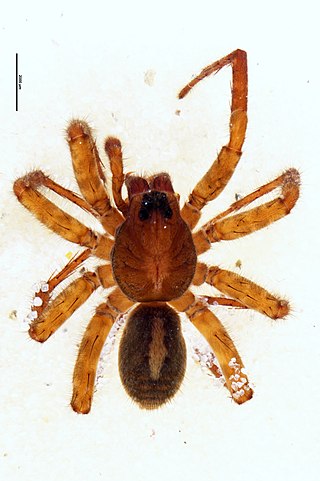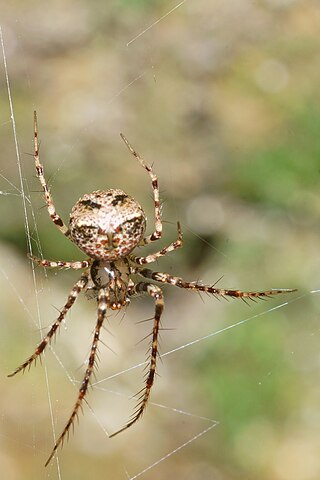
Dolomedes aquaticus is a species of fishing spider that lives and hunts along the gravel banks of unforested New Zealand rivers. It prefer open riverbanks where it typically lives under rocks, usually less than 5 metres away from the river. Its colouring allows it to camouflage against river stones. Normally nocturnal, it will sit and wait for prey after dark, and can survive for short periods under the water.

Anoteropsis is a genus of wolf spiders. All the species except one are found in New Zealand and its islands.

Anoteropsis litoralis is a species of wolf spider that is endemic to New Zealand.

Anoteropsis hilaris, commonly referred as the garden wolf spider or the grey wolf spider, is a species of wolf spider that is endemic to New Zealand.

Anoteropsis cantuaria is a species of wolf spider that is endemic to the Canterbury Plains of New Zealand.

Hexathele petriei is a species of Mygalomorph spider endemic to New Zealand.
Migas sandageri is a species of Mygalomorph spider endemic to New Zealand.

Australomimetus sennio is a species of Mimetidae that is endemic to New Zealand.

Celaenia atkinsoni is a species of Araneidae spider that is native to New Zealand and Australia.
Cryptaranea invisibilis is a species of orb-weaver spider that is endemic to New Zealand.

Laperousea blattifera is a species of sheet weaver spider found in New Zealand and Australia.
Haplinis fucatinia is a species of sheet weaver spider endemic to New Zealand.
Tekella absidata is a species of Cyatholipidae spider endemic to New Zealand.

Cycloctenus fugax is a species of Cycloctenidae spider endemic to New Zealand.

Cycloctenus pulcher is a species of Cycloctenidae spider endemic to New Zealand.

Steatoda truncata is a species of Theridiidae that is endemic to New Zealand.
Anoteropsis alpina is a species of Lycosidae that is endemic to New Zealand.

Anoteropsis insularis is a species of Lycosidae spider that is endemic to New Zealand.
Anoteropsis adumbrata is a species of Lycosidae spider that is endemic to New Zealand.
Anoteropsis blesti is a species of Lycosidae that is endemic to New Zealand.













